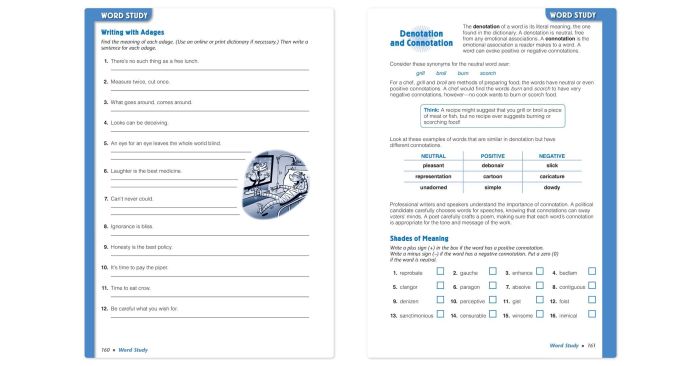Embarking on Vocabulary Workshop Level F Unit 6, we delve into the realm of vocabulary acquisition, organization, and assessment, empowering learners to master the intricacies of language and communication.
Through engaging activities, effective strategies, and practical applications, this unit provides a comprehensive approach to vocabulary development, fostering a deeper understanding of words and their usage.
Vocabulary Acquisition

Acquiring new vocabulary words is a crucial aspect of language learning. Effective strategies include:
- Contextual Exposure:Reading, listening, and interacting with authentic materials provides exposure to new words in meaningful contexts.
- Active Engagement:Engaging with new words through activities like flashcards, spaced repetition software, and games enhances retention.
- Word Analysis:Breaking down words into their root words, prefixes, and suffixes aids in understanding their meaning and relationship to other words.
Repetition and spaced retrieval are essential for long-term vocabulary retention. Repeated exposure at increasing intervals strengthens neural pathways, making words more accessible for retrieval.
Vocabulary in Context

Learning vocabulary in context is vital as it provides:
- Meaningful Understanding:Seeing words in authentic texts and materials helps learners grasp their nuances and appropriate usage.
- Collocation Awareness:Exposure to vocabulary in context fosters an understanding of how words are typically combined.
- Cultural Insight:Authentic materials offer insights into cultural contexts and idioms, enhancing comprehension.
To incorporate vocabulary into context, teachers can use:
- Authentic Texts:Utilize articles, news, and literary works that contain target vocabulary.
- Comprehensible Input:Provide materials that are slightly above students’ current vocabulary level, encouraging them to infer meaning from context.
- Activities:Engage students in discussions, role-plays, and writing tasks that require them to use target vocabulary in meaningful ways.
Vocabulary Organization
Organizing vocabulary words facilitates efficient retrieval and comprehension. Techniques include:
- Semantic Maps:Creating visual representations of word relationships, connecting words with lines and labels.
- Word Webs:Similar to semantic maps, but with a more hierarchical structure, branching out from a central concept.
- Flashcard Systems:Traditional or digital flashcards can be used to organize words by category, frequency, or other criteria.
- Technology-Assisted Tools:Vocabulary-building apps and online platforms provide structured organization and spaced retrieval features.
Organizing vocabulary promotes active engagement, improves retention, and facilitates transfer to real-world communication.
Vocabulary Assessment
Assessing vocabulary knowledge helps track progress and identify areas for improvement. Methods include:
- Cloze Tests:Sentences with missing words that students must fill in.
- Multiple Choice:Questions with several options, testing word recognition and understanding.
- Definition Matching:Matching words with their correct definitions.
- Picture-Word Association:Associating words with images.
- Free Response:Asking students to define, explain, or use target vocabulary in their own sentences.
Each method has advantages and disadvantages, so teachers should select the most appropriate assessment based on the learning objectives and student needs.
Vocabulary Instruction: Vocabulary Workshop Level F Unit 6
Effective vocabulary instruction involves:
- Explicit Instruction:Clearly defining new words, providing examples, and explaining their usage.
- Repeated Exposure:Incorporating target vocabulary into multiple lessons and activities.
- Active Engagement:Using games, discussions, and writing exercises to encourage students to interact with new words.
- Differentiated Instruction:Tailoring instruction to students’ individual needs and learning styles.
- Technology Integration:Utilizing vocabulary-building apps, games, and other digital tools to supplement instruction.
A well-structured vocabulary instruction program can significantly enhance students’ vocabulary knowledge and language proficiency.
Vocabulary Activities
Engaging and interactive vocabulary activities include:
| Activity | Materials | Procedures | Expected Outcomes |
|---|---|---|---|
| Word Charades | Index cards with target vocabulary | – Write target words on index cards.
|
– Improves comprehension of word meanings.
|
| Word Bingo | Bingo cards with target vocabulary, caller with word list | – Create bingo cards with target vocabulary.
|
– Enhances word recognition and recall.
|
| Vocabulary Scavenger Hunt | List of target vocabulary, clues | – Hide clues around the classroom that lead to target vocabulary.
|
– Promotes vocabulary exploration and problem-solving.
|
These activities can be adapted to different learning styles and levels, ensuring that all students benefit from engaging vocabulary instruction.
FAQ
What is the significance of repetition and spaced retrieval in vocabulary learning?
Repetition and spaced retrieval are crucial for strengthening memory and promoting long-term retention of vocabulary. By revisiting new words at increasing intervals, learners reinforce their knowledge and improve their ability to recall and use them effectively.
How can technology enhance vocabulary organization?
Technology offers various tools and applications that can assist learners in organizing and categorizing vocabulary words. Digital flashcards, semantic mapping software, and online dictionaries provide convenient and interactive ways to store, review, and retrieve vocabulary.